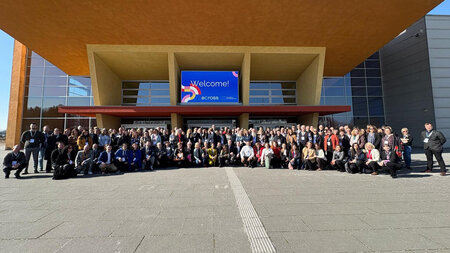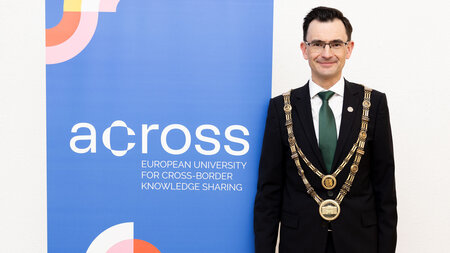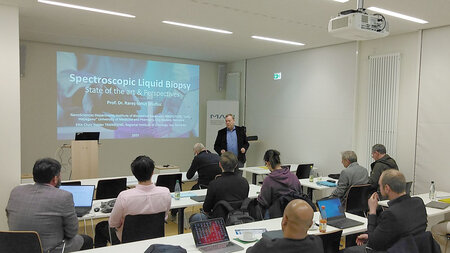Broadening Horizons and Getting Out of Your Comfort Zone
Marko Popovic came to Chemnitz in 2012 as an Erasmus student. Today, he works at the Ministry of Labour, Pension System, Family, and Social Policy in Zagreb, Croatia. He talks about his time in Chemnitz and its influence on his career path.
-

Marko Popovic came to Chemnitz in 2012 as an Erasmus student. Today, he works at the Ministry of Labour, Pension System, Family, and Social Policy in Zagreb, Photo: Kaja Pavlinić
Marko, your work is closely related to the European Commission. What exactly is your current role?
I am currently working as a Professional Associate at the Sector for the Coordination of European Affairs and International Cooperation at the Ministry of Labour, Pension System, Family, and Social Policy in Zagreb, Croatia. In 2018, I was appointed as a Croatian Alternate at the Indicators’ Sub-Group of the Social Protection Committee of the European Commission, along with the representatives from other member states. We are all working closely with the European Commission in preparing the policies. The nature of my job is such that I often have to travel to Brussels to participate in meetings.
What does this entail?
My everyday work entails the analysis and monitoring the implementation of policies of the European Union and the United Nations. In particular, the European Commission sends over the documents to the Ministry daily, for which we have to send our feedback and comments. At least once a month, there is a two-day meeting in Brussels, where these conclusions have to be presented. My job involves frequent travel and the organization of travel.
What are your main tasks and duties?
In addition to work related to the EU and UN affairs, my role is to present my country’s views on social indicators and various methodologies to show how each state and the EU as a whole stand economically and socially. My work also includes the preparation of speeches for officials and the analysis of various documents for bilateral and international meetings.
How has your average work day been impacted by Covid-19?
Croatia was in charge of the Presidency of the Council of the European Union for the first time from January 1 to June 30 2020. We spent the entire 2019 preparing the Presidency and 2020 was supposed to be the crown and the final result of all past preparatory work. Unfortunately, the pandemic changed our plans, and we only managed to conduct one-third of all planned events in-person. The rest of the events were moved online, including our regular social indicators meetings. In my opinion, these online meetings have proved to be quite effective, and I feel that the decision-making processes are much quicker and more efficient since the start of this pandemic. However, we should acknowledge that in the world of diplomacy, in-person meetings are essential because it’s harder to assess facial expressions and gestures over online conference calls. For example, it is hard to see whether someone is sarcastic when making certain comments.
You have studied in Zagreb, but have also spent some time as an Erasmus student in Chemnitz. What was this experience like?
I can honestly say that the experience of studying at Chemnitz University of Technology was one of my favorite life experiences. I was lucky to study there for two entire semesters (an entire year), and I think I got a much better feeling of what life is like in Germany and Saxony than if I was there for just a few months, which is often the case for exchange students. I chose Germany because I studied German during my schooling in Croatia and I wanted to improve it. During my studies at Chemnitz University of Technology, I attended courses in German and English in European studies, economics, and political science. I was thrilled with the courses and professors because they motivated me to do additional work beyond my university workload. Thus, in 2013, at Chemnitz University of Technology, I was one of the organizers of the conference “South Eastern European Days 2013”. In addition to my lectures, I had the opportunity to invite a professor from the Faculty of Political Science, University of Zagreb, to give a lecture on Croatian Accession to the European Union. To conclude, I can say that I acquired more theoretical knowledge in Zagreb, while at Chemnitz University of Technology I acquired more practical experience that prepared me for my current career.
Do you think your experiences at university have prepared you for your current role?
They certainly did, because when you come to study in a foreign country using a foreign language, and when you need to get used to living in another country, your horizons open up, and you get out of your comfort zone. I am currently working on international affairs and this requires a broader knowledge of general relations between countries in the world. For this reason, studying at Chemnitz University of Technology has helped me as I had the opportunity to meet students not only from the EU, but who were also from China, India, and even South America. I wouldn’t get this opportunity back in Zagreb,because there were fewer programs that would bring international students to Croatia.
What advice would you give to somebody who wants to work for the European Commission?
I would encourage all young people who are graduating from social sciences and are interested in international relations to apply for one of the internship positions at the institutions of the European Union. There are a lot of different internship programs and opportunities; you just have to figure out which ones sound most interesting to you and follow this criterion when choosing your internship and writing the application. Also, I think it’s good to participate in Erasmus+ projects because they can provide you with a better overview of the values of the European Union and the ways in which EU policies are being implemented.
What is, in your opinion, the biggest challenge the European Union is facing today?
At the moment, what is valid for the EU is also valid for the entire world, and this is the challenge of fighting the global pandemic and, consequently, the economic and social decline that we will all face. In my opinion, the current crisis is an opportunity to change the European Union into a more ecological, social, and just community. In addition to being focused on economic policies, it is essential to work on strengthening human rights and social protection. The European Union is one of the most developed parts of the world, but we still have 125-130 million citizens on the brink of poverty. Currently, too many people are affected by the crisis, and soon we can expect even more to be affected.
What are your hopes and dreams for your professional future?
In my career so far, I have had experience working in private, public, and civil sectors. All of my previous jobs were related to the European Union. My wish is to further deepen my knowledge in the Ministry by working on EU affairs from a state perspective, and to participate in the work of the European Commission, but also to keep contributing to my community through various projects and volunteering opportunities.
Marko Popovic studied at the Professorship Comparative European Governance Systems at Chemnitz University of Technology.
Matthias Fejes
04.11.2020





